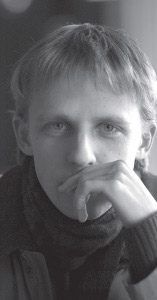Amongst the five finalists of the Toru Takemitsu Composition Award 2004 is Marius Baranauskas, one of the youngest Lithuanian composers, whose orchestral work Talking was chosen by the judge, Magnus Lindberg, from among 129 eligibly accepted entries. His final decision will be announced on May 30 at the Tokyo Opera City Concert Hall where all five compositions will be performed by the Tokyo Philharmonic Orchestra, with Norichika Iimori conducting.
|

photo: Mikhail Rashkovsky
|
At first hearing,
Talking gives no slightest surmise that it could have been written as a graduation piece by the author who is like a 'work-in-progress' himself, still looking for his path to follow. Its neatly orbicular form, rising from the initial unison, then unfolding into multidirectional sound space and extinguishing in the same point of departure (also mirrored, on the micro-level, in myriads of tiny dynamic and structural 'blisters') as well as perfect musical timing and resourceful use of orchestral colours, a strong sense of purport in development of musical processes and subtle references to the experiential universe lying beyond the music itself – all this gives an impression of a refined work, written by a consummate master. As for the latter, the impression is a bit misleading, but nonetheless flattering for a young composer like Marius Baranauskas. It seems that sometimes it suffices to have susceptive and 'uncluttered' ears and a strong will to start composing almost from the basic ABC's. "Music was not initially my field of creativity", says Baranauskas. "I started with the verbal medium, and now try to fuse both media by 'translating' words into musical sounds and timbres."
It was in
Talking that Baranauskas (not a very communicative type of a person himself) first applied the method of his own invention whereby he subjectively attributes acoustic and timbral equivalents to every sound of the spoken language. According to this technique of 'rendition', vowels are being translated into continuous, sustained sounds, and consonants – into continuous intoned (like 'm') and unintoned (like 'f') sounds, or accented strikes (like 't'). At the same time, it provides a host of variables, such as timbre, rhythm, pitch, volume, articulation, semantic linkage with the chosen text, combinations of the acoustically 'rendered' sounds and sung texts, etc., thus enabling the composer to come up with each time different solution to a given phonic material. In
Talking, the material, displayed at the foot of every page of the score as a "silent salutation" to the Creator, was taken from a poem by Rabindranath Tagore, whose emotional content is conveyed literatim in striking musical gestures – from rustling and humming percussion effects to sudden outbursts of brass chords and divine choruses of celesta, piano and harp.
After having thoroughly explored the potential inherent in the huge aggregate of 'rendered' sounds, Baranauskas later moved on to smaller musical settings, based on individual items of his 'musical alphabet'. One of such studies of individual sounds has taken shape in the electronic composition
NUNC, which was recently hailed as the best Lithuanian electroacoustic composition of the year 2003. Here the composer displays remarkable skill and versatility in manipulating the electronically processed timbres defined, once again, by the acoustic qualities of the four letters.
In his latest electroacoustic composition
Let for soprano and electronics to be premiered during the "Jauna muzika" festival in April, Marius Baranauskas has once again sought creative impulses in the poetry of his favourite poet, Rabindranath Tagore. This time the voice is treated as timbre delicately coloured by the vowels and consonants of the text. The electronic texture, woven from various transformations and distortions of voice, makes an organic blend with the part of the soloist. "I sought to compose music which would fully convey the content of the poem that mystically relates the total devotion to the will of the other", says Baranauskas who seems himself to humbly yield to the overpowering will of sounds in all of his recent compositions.
© Veronika Janatjeva
Lithuanian Music Link No. 8

